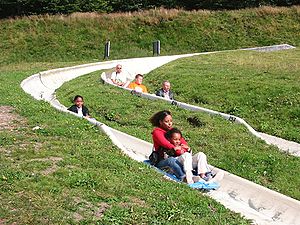Recreation: Difference between revisions
Fabrictramp (talk | contribs) Reverted 1 edit by 68.10.254.44; Revert edit test. (TW) |
|||
| Line 31: | Line 31: | ||
*[[Reading (activity)|Reading]] a [[book]] |
*[[Reading (activity)|Reading]] a [[book]] |
||
*[[Recreational drug]] use<ref name="Rx">{{cite web|url=http://www.ilo.org/encyclopedia/?doc&nd=857400241&nh=0|title=Alcohol and Drug Abuse|author=Sheila B. Blume|publisher=''Encyclopedia of Occupational Health and Safety''|accessdate=2007-06-18|quote=<small>Customs that dictate alcohol use persist in other work too, such as the “three martini” business lunch, and the expectation that groups of workers will stop at the neighbourhood pub or tavern for a few convivial rounds of drinks at the end of the work day.</small>}}</ref> |
*[[Recreational drug]] use<ref name="Rx">{{cite web|url=http://www.ilo.org/encyclopedia/?doc&nd=857400241&nh=0|title=Alcohol and Drug Abuse|author=Sheila B. Blume|publisher=''Encyclopedia of Occupational Health and Safety''|accessdate=2007-06-18|quote=<small>Customs that dictate alcohol use persist in other work too, such as the “three martini” business lunch, and the expectation that groups of workers will stop at the neighbourhood pub or tavern for a few convivial rounds of drinks at the end of the work day.</small>}}</ref> |
||
*[[ |
*[[Sex]] and [[bum]] |
||
*[[Sledding]] |
*[[Sledding]] |
||
*[[Shopping]] |
*[[Shopping]] |
||
Revision as of 09:44, 18 March 2009

Recreation or fun is the expenditure of time in a manner designed for therapeutic refreshment of one's body or mind. While leisure is more likely a form of entertainment or rest, recreation is active for the participant but in a refreshing and diverting manner. As people in the world's wealthier regions lead increasingly sedentary life styles, the need for recreation has increased. The rise of so called active vacations exemplifies this.
Health
A few individuals view recreation as largely non-productive, even trivial. Excessive recreation is not considered healthy, and may be labeled as escapism. However, research has shown that recreation contributes to satisfaction, and that the stress management aspects of it contribute to quality of life, health and wellness, happiness, and that the use of recreation as a diversion may have clinical applications to individuals with chronic pain and other health impairments. In some cultures and religions, recreation is encouraged on certain days and discouraged on others. For example, in Judaism, the Shabbat is a day for recreation,study and relaxation; some Christian churches use the Sabbath. However, others interpret the Sabbath to be a day of worship, in lieu of recreation.
Recreation is one (not the only) kind of stress management. According to research cited in Time magazine, stress is a major factor in many of the leading causes of death in the United States.[1]
Examples
In recent years, more exciting forms of recreation have received more attention, such as skiing, snowboarding, bungee jumping, sky diving, hang gliding, paintball, rock climbing, backpacking, canyoning, caving, BASE jumping, adventure tourism and motor sport.
See also
References
- ^ Claudia Wallis (1983-06-06). "Stress: Can We Cope?". Time. Retrieved 2007-06-14.
{{cite web}}: Italic or bold markup not allowed in:|publisher=(help) - ^ Sheila B. Blume. "Alcohol and Drug Abuse". Encyclopedia of Occupational Health and Safety. Retrieved 2007-06-18.
Customs that dictate alcohol use persist in other work too, such as the "three martini" business lunch, and the expectation that groups of workers will stop at the neighbourhood pub or tavern for a few convivial rounds of drinks at the end of the work day.
{{cite web}}: Italic or bold markup not allowed in:|publisher=(help)
